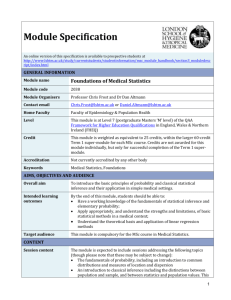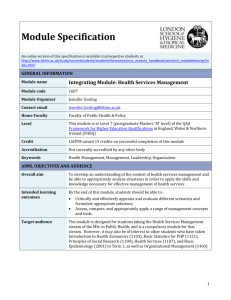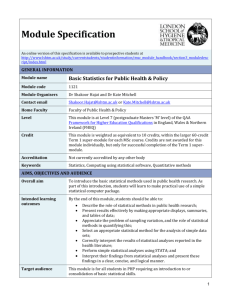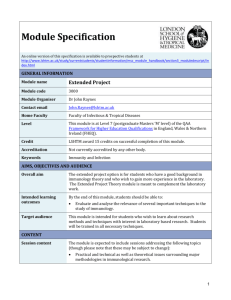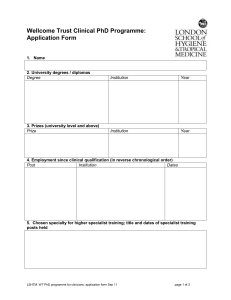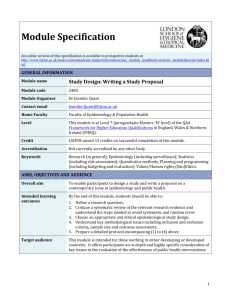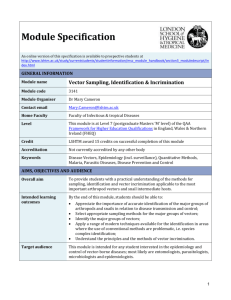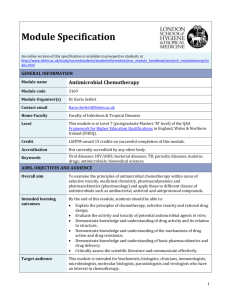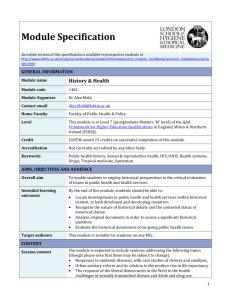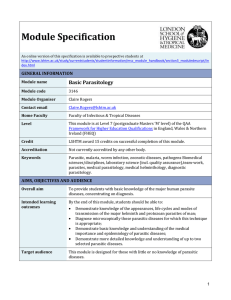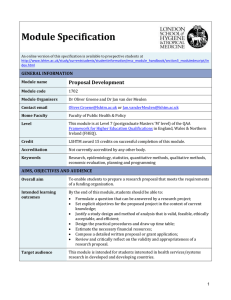1808 Health Systems Module Specification
advertisement
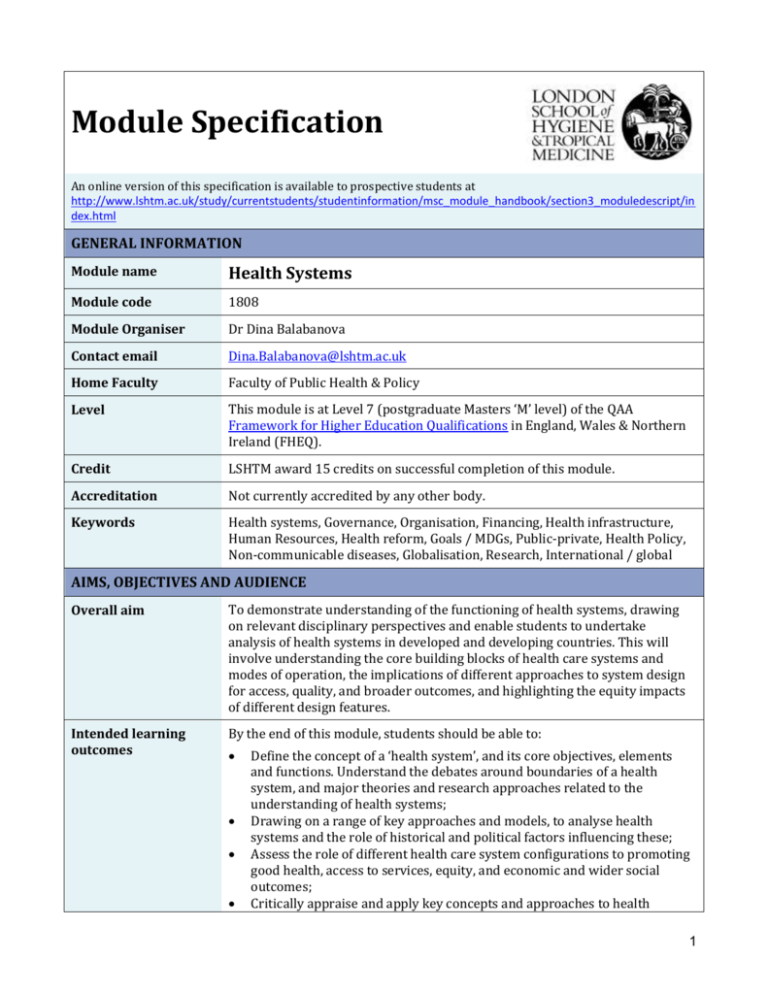
Module Specification An online version of this specification is available to prospective students at http://www.lshtm.ac.uk/study/currentstudents/studentinformation/msc_module_handbook/section3_moduledescript/in dex.html GENERAL INFORMATION Module name Health Systems Module code 1808 Module Organiser Dr Dina Balabanova Contact email Dina.Balabanova@lshtm.ac.uk Home Faculty Faculty of Public Health & Policy Level This module is at Level 7 (postgraduate Masters ‘M’ level) of the QAA Framework for Higher Education Qualifications in England, Wales & Northern Ireland (FHEQ). Credit LSHTM award 15 credits on successful completion of this module. Accreditation Not currently accredited by any other body. Keywords Health systems, Governance, Organisation, Financing, Health infrastructure, Human Resources, Health reform, Goals / MDGs, Public-private, Health Policy, Non-communicable diseases, Globalisation, Research, International / global AIMS, OBJECTIVES AND AUDIENCE Overall aim To demonstrate understanding of the functioning of health systems, drawing on relevant disciplinary perspectives and enable students to undertake analysis of health systems in developed and developing countries. This will involve understanding the core building blocks of health care systems and modes of operation, the implications of different approaches to system design for access, quality, and broader outcomes, and highlighting the equity impacts of different design features. Intended learning outcomes By the end of this module, students should be able to: Define the concept of a ‘health system’, and its core objectives, elements and functions. Understand the debates around boundaries of a health system, and major theories and research approaches related to the understanding of health systems; Drawing on a range of key approaches and models, to analyse health systems and the role of historical and political factors influencing these; Assess the role of different health care system configurations to promoting good health, access to services, equity, and economic and wider social outcomes; Critically appraise and apply key concepts and approaches to health 1 Target audience systems evaluation and performance measurement, the role of policy actors, and global influences on health systems; Be able to apply a health systems approach to major health challenges in a range of different contexts. It is expected that the module will be of interest to students on the MScs in Public Health, Health Policy Planning and Financing and Public Health in Developing Countries. CONTENT Session content The module is expected to include sessions addressing the following topics (though please note that these may be subject to change): 1. What is a health system? What are the health systems for? 2. Health system functions: Financing. 3. What makes up a health system? Governance function. 4. Health system functions: Creating resources. 5. Health system functions: Provision. 6. Global Health Systems, Local Health Providers and Praxis: the View from Below. 7. Universal coverage as a key health system goal. 8. Pluralistic health systems: what challenges for regulation? The role of the private/voluntary sector in health systems- models of engagement. 9. Evaluating health systems and their performance. 10. Globalization: panacea or poison for public health? TEACHING, LEARNING AND ASSESSMENT Study resources provided or required A reader specifying essential and further readings, and online resources in the area of health systems will be provided to students. All readings are available through the library or the internet. Teaching and learning methods The module includes a combination of lectures, seminars, group activities, and self-guided learning. Students will be divided into seminar groups covering high- or low-income settings (and possibly middle-income) according to their preferences. The seminars will be to a large extent student-led and will focus on practical case studies chosen to illustrate key policy issues, and will be supplemented by private study. Assessment details The overall mark will consist of 75% for the editorials and 25% given for group work. A. Individual assessed written ‘editorial’ of up to 1500 words, excluding references, figures and tables. It will be written in the style of BMJ or the Lancet and examples will be provided. The topic can be selected from a list of questions provided by the course organiser or seminar leaders, or chosen by the students. The questions will draw on the concepts covered in the lectures and essential readings. Students who are required to re-sit, or granted a deferral or new attempt, specifically for the editorials, will be required to revise and resubmit the same editorial. 2 B. The group work mark will consist of: 75% aggregate mark through peer assessment (using a blind vote), and 25% given by the seminar leader. Students will be provided with clear criteria for assessment to guide them in preparing their presentations. Assessment dates Assessments will be due on 12 February 2016. For students who are required to re-sit, or granted a deferral or new attempt, the next assessment date/deadline will be the standard School-recommended date in mid/late September 2015. Language of study and assessment English (please see ‘English language requirements’ below regarding the standard required for entry). TIMING AND MODE OF STUDY Duration The module runs for 5 weeks at 2.5 days per week; this module runs between Wednesday lunchtime and Friday afternoon. Dates For 2014-15, the module will start on Wednesday 13 January 2016 and finish on Friday 12 February 2016. Timetable slot The module runs in LSHTM timetable slot C2. Mode of Study The module is taught face-to-face in London. Both full-time and part-time students follow the same schedule. For full-time students, other LSHTM modules are available in the other half of the week for the C and D slots. Learning time The notional learning time for the module totals 150 hours, consisting of: Contact time ≈ 32 hours Directed self-study ≈ 25 hours Self-directed learning ≈ 43 hours Assessment, review and revision ≈ 50 hours APPLICATION, ADMISSION AND FEES Pre-requisites None. English language requirements A strong command of the English language is necessary to benefit from studying the module. Applicants whose first language is not English or whose prior university studies have not been conducted wholly in English must fulfil LSHTM’s English language requirements, with an acceptable score in an approved test taken in the two years prior to entry. Applicants may be asked to take a test even if the standard conditions have been met. Student numbers Student numbers are typically 60-70 per year; numbers may be capped due to limitations in facilities or staffing. Student selection Preference will be given to LSHTM MSc students and LSHTM research degree students. Other applicants meeting the entry criteria will usually be offered a place in the order applications are received, until any cap on numbers is reached. Applicants may be placed on a waiting list and given priority the next time the module is run. Full Registration (full participation) by LSHTM research degree students is required for this module. 3 Fees For registered LSHTM MSc students, fees for the module are included within MSc fees (given on individual course prospectus pages). If registering specifically for this module, as a stand-alone short course, individual module fees will apply. Tuition fees must be paid in full before commencing the module, or by any fee deadline set by the Registry. Scholarships Scholarships are not available for individual modules. Some potential sources of funding are detailed on the LSHTM website. Admission deadlines For 2015-16: For registered LSHTM MSc students, the module choice deadline (for Term 2 and 3 modules) is Friday 20 November 2015. If registering specifically for this module, applications may be made at any time but, as places are limited, early application is recommended. All applications should be submitted by, at latest, 8 weeks prior to the start of the module. Formal registration will take place on the morning of the first day of the module. ABOUT THIS DOCUMENT This module specification applies for the academic year 2015-16 Last revised 16 July 2013 by Dina Balabanova; 20 July 15 minor updates by SDB London School of Hygiene & Tropical Medicine, Keppel St., London WC1E 7HT. www.lshtm.ac.uk 4

